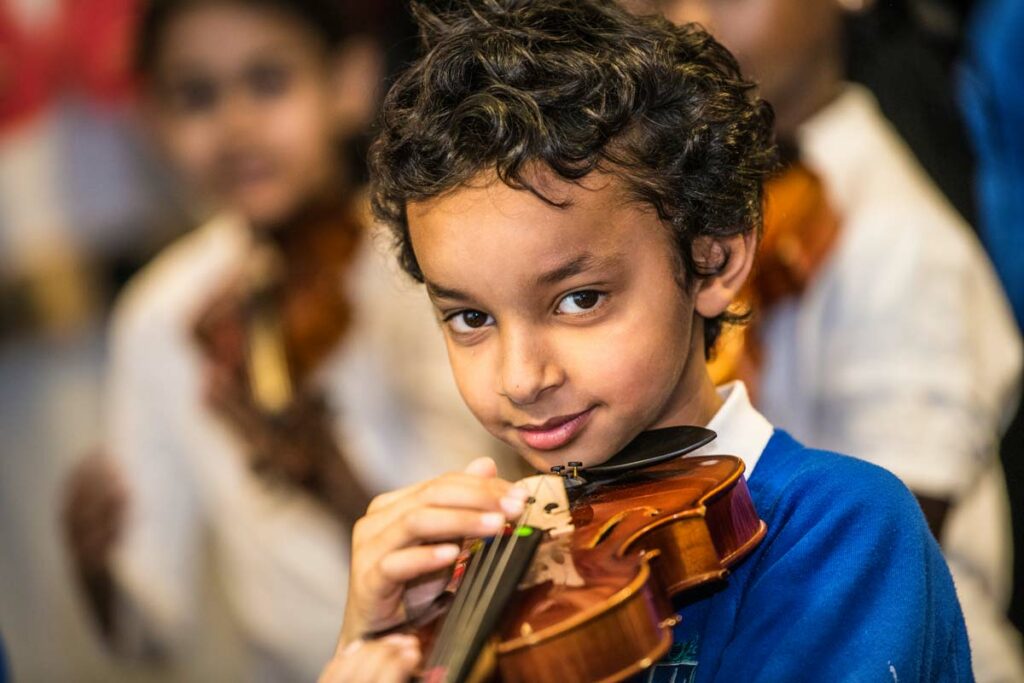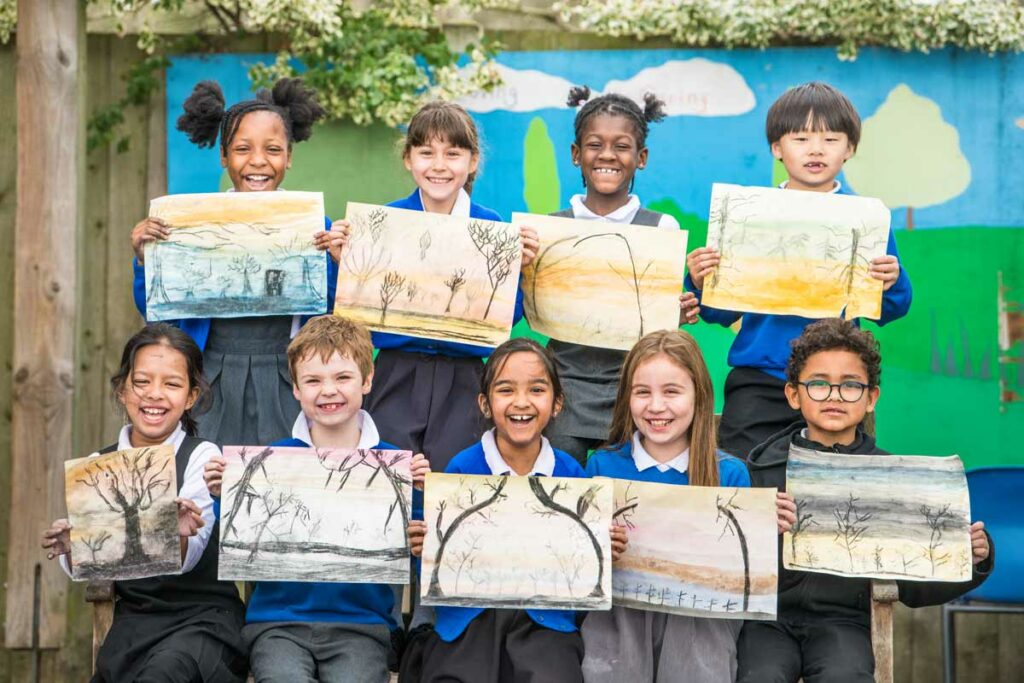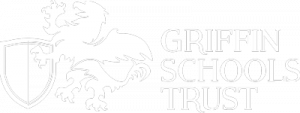Latest news
Computing via History in Year 1
Gallery
Filter
>> MATHS
Intent
At Riverley, it is our intent to deliver a mathematics curriculum that meets the needs of our learning communities; staff, pupils and families, and this is reflected in our meticulous planning, learning environments and resources. We believe that mathematics allows us to make sense of the world and widens horizons by giving us the tools to analyse, communicate, use information, and build on ideas. We teach a rich, balanced and progressive curriculum which facilities: learning through investigation, risk-taking and a lack of fear of being wrong. It is our aim for our children to have choice over their learning as they develop the skills to
reason, problem solve and develop fluent conceptual understanding in each mathematical area. Pupils have access to a Maths curriculum which equips them with the skills necessary to succeed on whichever path they follow.
Through carefully structured planning, our children explore skills and knowledge in depth and gain a secure understanding of each subject matter. Key knowledge and skills are also revisited regularly allowing repetition to embed learning. We have incredibly high expectations of our pupils to develop rapid recall and effective written strategies for problem solving.
Our Maths curriculum includes all the elements of the revised National Curriculum for mathematics and is taught wherever possible through real life contexts or themes to allow children to make better sense of the world around them. Using and applying personal Maths knowledge through the confident ability to question, reason and solve problems is a priority along with being able to use a range of mathematical tools such as mental calculations, pencil and paper methods, shapes, measuring equipment & technology.
We intend for all pupils to experience an inspiring, number-rich and motivational Maths environment. We are committed to ensuring that all children become mathematicians as they benefit from positive role models in all aspects of their learning as a result of all staff promoting the importance of subject.
Our youngest children begin their early mathematical development supported by excellent early mathematical teaching. This supports the development of early number sense, giving them the foundational skills needed to confidently reason and solve mathematical problems.
Our intent is for every child to be challenged to excel in Maths and leave Riverley as independent mathematicians, with the confidence and skills required to calculate fluently, reason mathematically and solve problems efficiently. They will be curious, critical and self-reflective in all aspects of mathematics and fully equipped for the next step in their educational journey.
Implementation
Staff subject knowledge allows the intentions of our mathematics curriculum to be delivered successfully. We continually strive to build upon the excellent understanding of the expectations of the curriculum that our staff have. We achieve this through regular quality CPD, and targeted teaching support is provided through the subject lead, external courses, collaborative lesson study as well as advice and support from a teaching and learning consultant for mathematics. All staff are encouraged to raise questions, seek support and request further training if needed in order to ensure everyone is confident in what they teach. Good practice is shared between staff and all CPD is used to inform and improve teaching and learning across school.
Mixed attaining teaching and flexible groupings, centered around pupil choice, enables the delivery of an empowering inclusive Maths Curriculum.
Resources and equipment are audited regularly so that children have materials of a high quality to support their learning. Our resources allow us to better use models and images to embed learning in each area and enable the progression from concrete to pictorial to abstract. Children are familiar with these resources and can access them independently.
Curriculum Maps sequence learning in units enabling children to get to grips with different areas of Maths for extended periods of time. Alongside this, we use many other resources to ensure that our offer is rich and varied. These include White Rose, Collins Maths, NCTEM, NRich, and Third Space Learning. Through this approach, the children are exposed to a wide variety of challenges therefore ensuring that the children apply their fluency, problem solving and reasoning skills in different formats. Although our maps provide teachers with a suggested time frame for how long should be spent on topics, teachers have autonomy over this. Decisions about when to progress are always based on the security of pupils’ understanding and their readiness to progress to the next stage. Pupils who grasp concepts rapidly are challenged through being offered rich and sophisticated problems before any acceleration through new content. Those who are not sufficiently fluent with material consolidate their understanding through additional practice, before moving on.
Teachers implement the schools agreed calculation policies for progression in written and mental calculations. Correct mathematical vocabulary is used by all teachers and this is discussed with and explained to children who are then encouraged to use it independently when talking about Maths. Vocabulary is displayed clearly on working walls and is referred to in every lesson. Timetabled interventions for Maths are in place for children with additional needs; all other children receive regular group support as part of their Maths lessons with further support for individuals or small groups where a need is identified.
Fluency is developed through repeating, reinforcing and revising key skills; arithmetic is explicitly taught in all year groups. Children are given time to practice and perfect their calculation strategies including giving pupils the opportunity to make appropriate decisions when estimating, calculating and evaluating the effectiveness of their chosen methods. Feedback is given in a variety of ways to ensure pupils are well informed and making visible progress. Discussion is essential to learning and children are encouraged to discuss their thoughts, ideas and methods with a partner, group or the teacher. Task types are varied to suit different pupils and their learning preferences; developing rapid reasoning skills and diving deeper remain areas of key focus. Investigative tasks are designed to allow pupils to follow lines of enquiry and develop their own ideas, justifying and proving their answers. Children work both collaboratively and independently when solving problems which require them to persevere and develop resilience.
Impact
Through discussion and feedback, children talk enthusiastically about their Maths lessons and speak about how they love learning about Maths. Children leave as Creative, Ambitious, Responsible and Empathetic Mathematicians. They can articulate the context in which Maths is being taught and relate this to real life purposes. Children achieve highly in the subject with a large percentage surpassing age-related expectations. They understand the relevance and importance of what they are learning and make links not only between areas of mathematical learning but to real world concepts.
Children have a positive view of Maths due to learning in an environment where Maths is promoted as being an exciting and enjoyable subject in which they can investigate and ask questions; they know that it is OK to be ‘wrong’ and that this strengthens their learning because the journey to finding an answer is most important. Lessons use a variety of resources to support children’s learning and includes different representations of mathematical concepts. Children are confident to ‘have a go’ and choose the equipment they need to help them to learn along with the strategies they think are best suited to each problem. Our children have an in-depth understanding of their strengths and targets for development in Maths and what they need to do to improve.
Our Maths books evidence work of a high standard of which children clearly take pride; the range of activities demonstrate excellent coverage of fluency, reasoning and problem solving. Learning in tracked and monitored to ensure all children’s needs are met. Children leave Riverley with a deep love and appreciation for the lifelong development of Mathematics skills and Knowledge.







